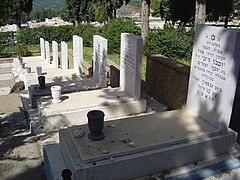| |||||
| Decades: | |||||
|---|---|---|---|---|---|
| See also: | |||||
Events in the year 1974 in Israel.
| |||||
| Decades: | |||||
|---|---|---|---|---|---|
| See also: | |||||
Events in the year 1974 in Israel.

The most prominent events related to the Israeli–Palestinian conflict which occurred during 1974 include:

Notable Palestinian militant operations against Israeli targets
The most prominent Palestinian Arab terror attacks committed against Israelis during 1974 include:
Notable Israeli military operations against Palestinian militancy targets
The most prominent Israeli military counter-terrorism operations (military campaigns and military operations) carried out against Palestinian militants during 1974 include:
On November 22, 1974, the United Nations General Assembly voted the United Nations General Assembly Resolution 3236 "Recognizing the Palestinian people's right to self-determination, and officializing United Nations contact with the Palestine Liberation Organization and adding the "Question of Palestine" to the U.N. Agenda".
This Resolution "Reaffirms the inalienable rights of the Palestinian people in Palestine, including: (a) The right to self-determination without external interference; (b) The right to national independence and sovereignty; Reaffirms also the inalienable right of the Palestinians to return to their homes and property from which they have been displaced and uprooted, and calls for their return; Emphasizes that full respect for and the realization of these inalienable rights of the Palestinian people are indispensable for the solution of the question of Palestine; Recognizes that the Palestinian people is a principal party in the establishment of a just and lasting peace in the Middle East; Further recognizes the right of the Palestinian people to regain its rights by all means in accordance with the purposes and principles of the Charter of the United Nations;"
